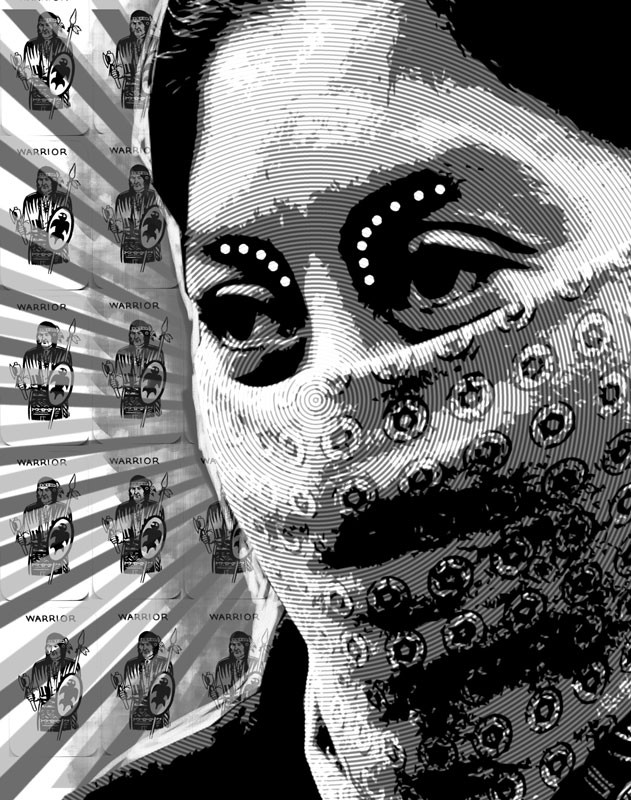
The Oshkimaadziig Unity Camp is a land occupation and cultural revitalization project being carried out by the Anishinabek Confederacy To Invoke Our Nationhood (ACTION).
Located in what is now Awenda Provincial Park, two hours north of Toronto, the project is a reclamation of Council Rock, one of six traditional embassies established in intertribal treaties between the Anishinaabek (Ojibwa) and Haudenosaunee (Iroquois).
The following conversation developed around a fire as Oshkimaadziig Unity Camp co-founders Giibwanisi, Kaikaikon, and Sleeping Grizzly discussed questions emailed to them by journalist Megan Kinch.
Megan Kinch: Mainstream environmentalism has been sidetracked into greenwashing, environmental capitalism, and tokenistic gestures. When even David Suzuki is writing essays about the failure of environmentalism, we know that something has gone wrong.
People affiliated with environmental justice movements in Canada have been trying to put solidarity with Indigenous peoples at the forefront, but these efforts haven’t gathered the kind of support that mainstream environmentalism used to enjoy, nor has the meaning of solidarity been well defined.
Do you see your struggle as relating to environmentalism? Is there an environmental movement that you feel could support struggles like yours? Or does a new movement have to be built from the ground up?
Kaikaikon: If you want to call our struggle “environmentalism,” yes, sure. But at the same time, we are much more than that. It’s a spiritual struggle. It’s a political struggle. [Our struggle is] a different kind. We have a way of life: it’s environmentalism, it’s spiritualism, it’s matriarchy. Environmentalism is just one aspect of it. We are so much more.
Giibwanisi: To answer that question, I think you have to look at the medicine wheel. You have to look at the physical, the emotional, the mental, the spiritual; the land, the air, the fire, the water. It is all one, one and the same. We cannot look at just one aspect.
Kaikaikon: It’s not under one genre or ideology of struggle or fight. You can’t categorize our fight as an Anishinaabek liberation movement and resistance. Even in the Anishinaabek Indigenous resistance movement where there’s our people who have security culture and, I guess, warrior-ism, for lack of a better word, what we’re doing is trying to achieve every aspect of who we once were and trying to bridge the gap with living in this society, with the technology of everybody who is in that medicine wheel.
When you go back and classify our individual struggle as environmentalism, then we’ve got to say no. People have their own definition of environmentalism. Greenpeace has their own view of environmentalism, and they are against seal hunts, which is people’s traditional diet and right to feed themselves from the land. There are some things our allies may not agree with, like hunting and trapping. And that’s not, in their eyes, environmentalism [laughs].
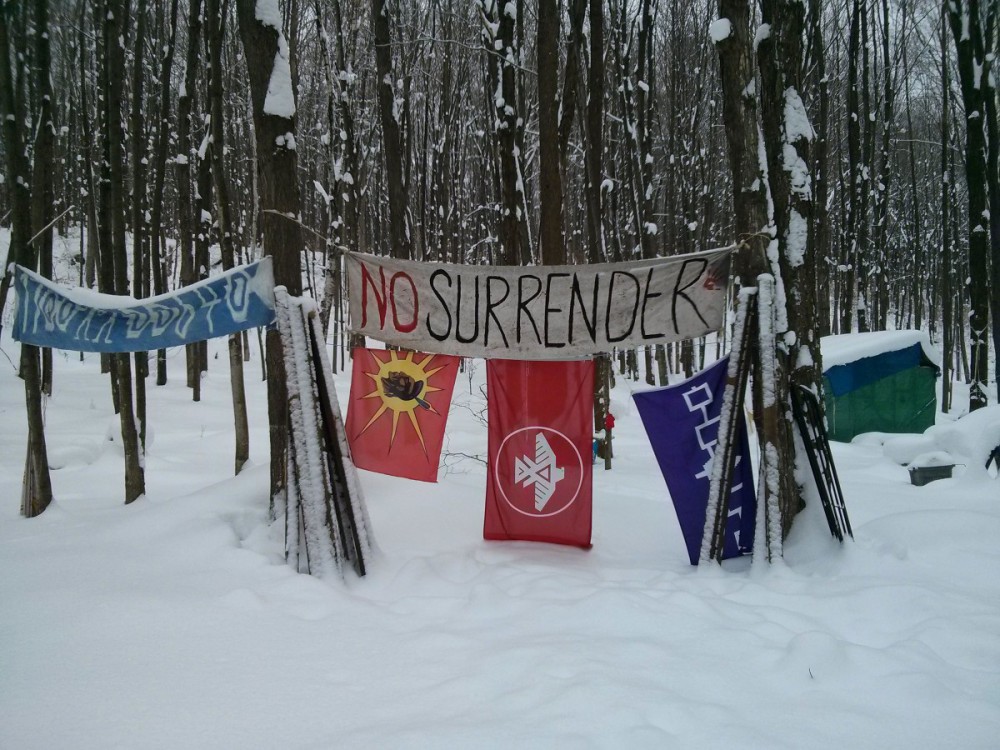
Sleeping Grizzly: It is not really environmentalism. It’s more of us living with the land, with what the land provides. But don’t take from the land more than you need. When you take from the land, you have to make sure that what you’re taking – like when we want firewood or we want to build a box or a canoe or something – we’re going to take from the dead. We’ll only take from the living when we need to build something with structure, something that can dry over time and provide a lot of strength, something we can manipulate to the way that we need, but not take more than we need.
Giibwanisi: I have not seen an environmental movement that could support struggles like us because, as we said before, there are so many different genres of environmental activism whether it’s fracking or tarsands or pipeline or nuclear or “save the water” or “save the trees” or “save the air.” There is not a single organization that I have seen that encompasses it all.
So if you want to consider Anishinaabekism or Haudenosaunee-ism who stands against all of these things, I don’t know. I have not seen it. Idle No More seems to be about the water and some of Bill C-38 and Bill C-45, but at the same time, they have their own view of liberation. And they’re very exclusive. So a lot of the times, we were not included in their liberation agenda because at one time they were adamantly and vehemently opposed to blockades and land reclamations, and they distanced themselves from them.
Kaikaikon: Look at the different camps, like the Unist’ot’en camp [in B.C.] and all these similar actions, who are living off the land. Under the definition of what an environmentalist is, I’m not too sure if it is or is not [laughs].
Giibwanisi: Yeah, I think I’d have to agree with the Unist’ot’en.
Kaikaikon: Because, first, under our teachings, it says we have to concentrate on the South, the family, community, nation, the people of our Turtle Island, our continent. Then we start making alliances with these other folks. And I think our ideas and teachings can really benefit this person who’s asking these questions. But they could learn a lot from our people if they have some humility because our people have been observing for thousands of years and survived. We’re still surviving. They can just observe from the people who’ve been here first and lived through a lot. There’s been a lot of environmental disruptions, and we’re still here surviving.
Your occupation at Oshkimaadziig Unity Camp is on the site of a Council Fire. It’s been an ongoing debate on the left as to how different peoples should relate to each other in struggle. Some would argue that everyone should be in the same organizations and struggle on a class basis, others that nationally oppressed peoples need their own separate organizations which should relate to others.
Today there is also the theory that settler organizers need to take direction from Native organizers, but this is more useful as a guideline for settlers participating in Native struggles rather than as a directive for social movements as a whole. What do you think should be the organizing relationships between Native and non-Native people?
Kaikaikon: In my own opinion, what we’re trying to achieve here is we’re trying to create a confederacy. We’re trying to rebuild our confederacy. We had alliances with other Indigenous nations, like the Haudenosaunee and the Cree and the Wendat, so we’re trying to build our own, reassert our own laws, our trade alliances, and through that came the Two Row Wampum. And the settler society, we have an agreement with them that we’re trying to uphold here.
I don’t want to sound racist [laughs]. I have to be careful about how I answer this. But our nations have been dealing with Eurocentric people for too damn long. It comes to a point [where] we need to drop out of these treaties, and even the 1764 Treaty of Niagara Covenant Chain belt, and re-establish something new [with] the other people who are oppressed from all over the world but something that is more representative of the minorities and the oppressed people. And when the question is asked about non-Native people, you have to ask: which non-Native people? I think we have to have an equal relationship, but it has to be with people of struggle who come from other nations. And they have to maybe start a new government.
Giibwanisi: So what should be the organizing relationship?
Kaikaikon: Until that happens, all lands come back to us! [laughs] We can establish zones like their cities and shit where they can remain but we’re still the landlords. This is kind of radical, but those people, they need to overthrow their friggin’ governments. But we need to work with these people out there to overthrow the governments and the police and the military – which is a damn hard thing to do, but we need to do that – and re-establish our governance, our agreements, our relationships. And that I believe is true for the other minorities who come here. They don’t even know the relationship that exists, and I think we’d find common ground to unite.
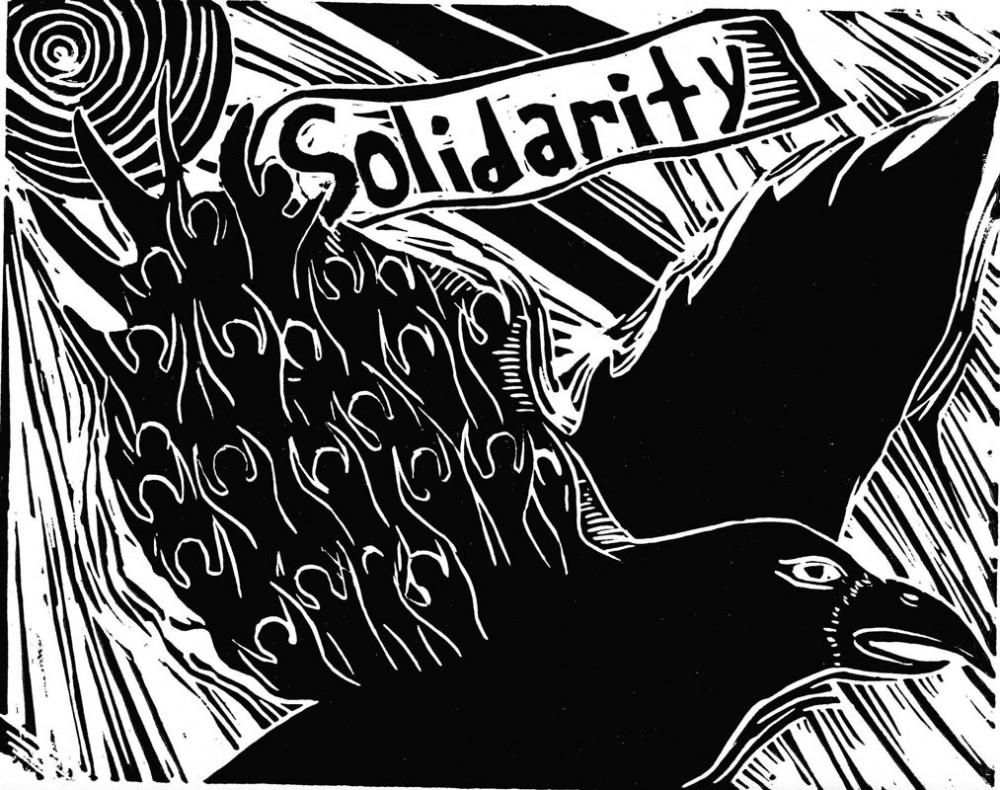
Giibwanisi: Going back to the Two Row Wampum, it says that we’re not supposed to steer each other’s boats. But the way that I perceive things is that the canoes have been hijacked and are actually aboard the settler ship. And we are basically trying to live our canoe way of life on top of that settler ship. So saying that I’m not supposed to steer the settler ship, well, you know what, my fucking canoe is sitting in that fucking settler ship. So national liberation for Native people and organizing is like saying, you know what, I don’t want to tell you how to run your own fucking ship, but your ship and the people that run it, the captains, they are not listening to the workers or to whomever, the deckhands and whatnot.
So I guess the way to answer that question is, if you are not actively trying to overthrow the captain, then I think that maybe it’s time that we are in a position to say, you know what, in order to save humanity, to save ourselves, save Turtle Island – because the original agreements have been so intertwined and entangled – I think at times that Native people do have to be in a position to tell non-Native people what to do.
Kaikaikon: We were just talking about this last night. And I was thinking about this all day, how to write this, because it’s been on my mind for a while, because it needs to be said without hurting people’s feelings, because it needs to be said and it needs to be brought out amongst our brothers and sisters out there who are working with these activists in the different organizations.
We’ve been colonized for so long that some of us, even on the front-line struggles and even back at home in our communities, have developed a kind of syndrome where we have all these fears and intimidations and feelings of inferiority to white people. This is something internal that we’re dealing with. So when we’re working with these people, there’s little, subtle ways in how they come and “help” that they make our people feel inferior.
Me, I feel like we’re dependent on their help. So no matter how they’re trying to help, it’s funny, but they’re still the colonists. The white people are the colonists. Because they’re helping to decolonize, but that word “colonize” is still in there. They are decolonizing, so they’re still the Indian agents running around trying to do what’s best for Indians. Because they’re the ones who think they know it all, so they’re helping us. Even by answering these questions, we use the English language and their ideology – we’re using everything that’s theirs. Even their Marxism.
Somewhere there’s our own war chiefs and our own ideas that we should be using to answer these questions. We’re still finding out ourselves, but we need to utilize other people’s … the revolutionary schools of thought, I guess. Marxism?
Do you think that Indigenous agreements such as the Dish With One Spoon and the Two Row Wampum are relevant here? Do they apply to the state, or do they apply to peoples including western revolutionaries?
Kaikaikon: What we’re trying to accomplish here is to rebuild ourselves and rebuild our alliances with other Indigenous nations. Our responsibility is to our people first and to our communities and our families. So it applies to the state and it applies to them. Because what you said, we can’t answer that. It’s up to them. It’s up to these newcomers to settle that and fight amongst themselves on that. Because we have our own fight to do trying to be with our people who are trying to speak and represent us, who are going against these original agreements. So we’re trying to liberate ourselves from what they’re doing to us, what our chief and [band] council and these peoples are doing. We’re trying to liberate ourselves, so we have to work together with our common allies to remove this shit in our own communities. So it is relevant.

Giibwanisi: Personally, I think that the Two Row, the two relationships between settlers and Native people that is the Two Row, is relevant because of the entire context, its fundamental principles. And the fundamental principle is the relationship, from an Indigenous perspective, with the Two Row Wampum and with everything, with the creator, the earth, the sun, the moon, the stars, the two-leggeds, the four-leggeds, the wingeds, the crawleds, the ones that go in the water. And I think that, yeah, the founding principles of the Two Row Wampum, we could use those things.
But at the same time, the Two Row Wampum was never entered into with the one good mind from the settlers’ point of view. They did not use their one good mind to make this relationship. I think it can be applied if people come with that one good mind and they want to work together. I think that can be.
But also understanding the Two Row Wampum with the settlers, that was made with mostly white people. And now we find that we live in a society out there where there are many people of many different colours. And if we go back to that settler ship, there was class division on that settler ship: there was the captain, there were his lieutenants, there were the deckhands, there were indentured servants, and there were slaves stuffed in the back, stuffed in the bottom of those ships. So I think that the Two Row Wampum has to be inclusive of the other nations that are here. And I truly believe that, had our people known that there were slaves stuffed into the bottom of those ships, I truly believe that we probably never would have entered into those agreements knowing how they treat other humans. Because if we were to look and see those slaves, how could someone enter into one good mind with that?
To what extent do you find western philosophies of struggle – Marxism, anarchism, social democracy – to be useful to you? I’ve seen you identify capitalism as a central force to struggle against, in addition to colonialism. Does western analysis like Marxism help in understanding those forces? What are the limits of these philosophies for your struggle?
Giibwanisi: From my own perspective, I have to be open-minded to everything, to all sorts of struggles including those mentioned above.
But there are things that are useful and there are things that are not useful. I don’t subscribe to anarchism because I don’t believe in disorganization. I like some of the things that are said about Marxism, especially the scientific approach to understanding economics and political science. But at the same time, there are a lot of things that I do not agree with in Marxism. Marxists often omit two parts of the medicine wheel. Marxism focuses on a specific ideology which is the mental, and probably the physical, like taking physical action in revolution. But Marxists omit the emotional and the spiritual context of how we think and operate.
Interview adapted from the open source journal Alternate Routes.


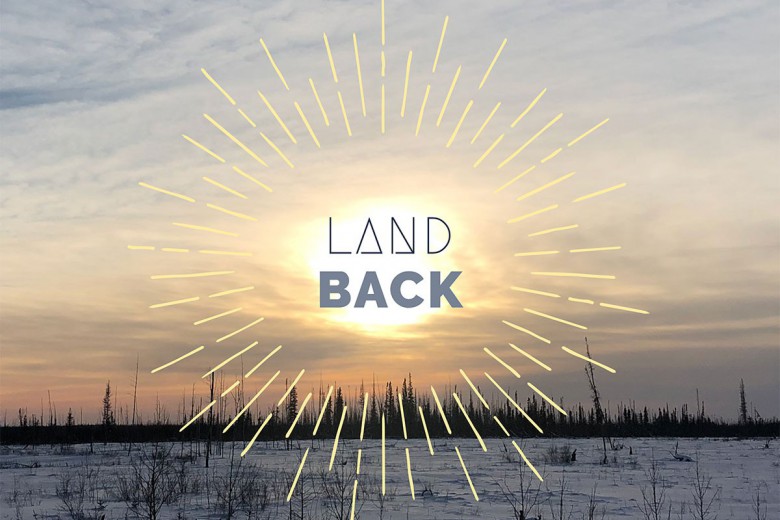

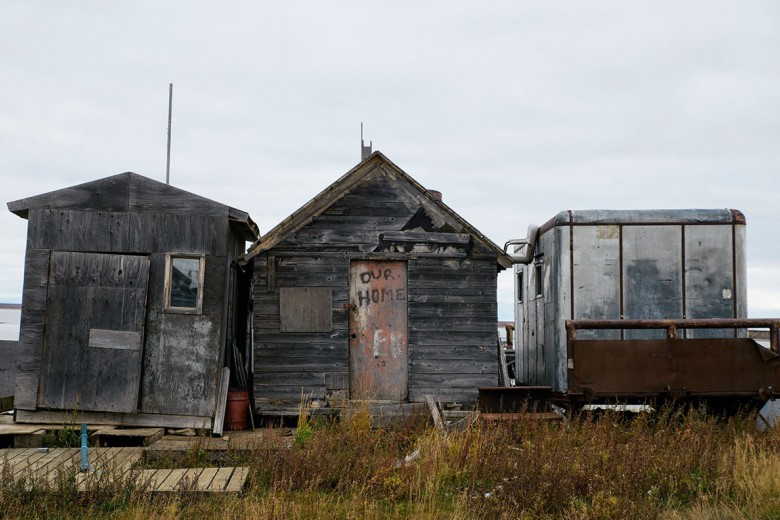
_780_520_s_c1.png)
